How to Check Your Dog for Ticks: Vet Approved Guide for 2025 🩺🐶

In this article
How to Check Your Dog for Ticks: Vet Approved Guide for 2025 🩺🐶
By Dr. Duncan Houston BVSc
Ticks are tiny arachnids that latch onto your dog—often in hidden areas—and can carry serious diseases like Lyme, ehrlichiosis, and tick paralysis. Regular inspections after outdoor activity are your first line of defense. Here's a step-by-step vet-approved routine for 2025:
1️⃣ Run Hands Over the Body
Gently feel your dog’s coat from head to tail. Look for small bumps or nodules that may signal attached ticks.
2️⃣ Focus on Common Hiding Spots
- Ears & eyelids: Ticks love warm, moist, thin areas.
- Neck & collar line: Easy attachment points after outdoor walks.
- Armpits & groin: Dark crevices where ticks often feed.
- Between toes & paw pads: Small ticks can lodge in webbing.
- Base & underside of tail: Another hidden hotspot.
3️⃣ Part the Fur & Inspect Close
If you feel a bump, gently part the hair and inspect the skin. Ticks range from pinhead size to small grape-like engorged forms.
4️⃣ Remove Ticks Safely
👉 Use fine-tipped tweezers or a tick tool. Grasp the tick close to the dog’s skin and pull straight out with steady pressure—no twisting! Disinfect the site and your hands afterwards. Avoid folklore methods like petroleum jelly, which only increases risk.
5️⃣ Save the Tick
Place the removed tick in a sealed container with rubbing alcohol. This helps your vet identify it and test for diseases if needed.
6️⃣ Monitor Your Dog
Over the following weeks, watch for:
- Fever, lethargy, stiffness, lameness
- Swollen lymph nodes or enlarged joints
These symptoms may signal Lyme, ehrlichiosis, or tick paralysis and require veterinary evaluation.
7️⃣ Prevention Is Key
Speak with your vet about year-round tick preventatives—oral or topical—and consider environmental measures like yard treatments and keeping bushes trimmed.
📊 Quick Tick-Check Overview
| Action | Where/How | Why |
|---|---|---|
| Hand run | Head→tail | Feel bumps |
| Inspect hotspots | Ears, toes, groin, tail | Common tick areas |
| Part fur | At bumps | See attached tick |
| Remove tick | Tweezers/tool | Prevent disease |
| Save tick | Alcohol jar | For vet testing |
| Monitor pup | Next 4 weeks | Early symptoms |
| Use prevention | Vet-advises | Reduce risk |
🔍 Final Thoughts
Daily tick checks after outdoor activity can catch ticks before they transmit disease. With careful inspection, safe removal, and prevention strategies, you can keep your dog healthy and tick-free in 2025 and beyond. 🐕❤️
Need help choosing the right preventatives or identifying tick-borne symptoms? Download the Ask A Vet app—24/7 access to expert vet advice, always. 📱🩺






